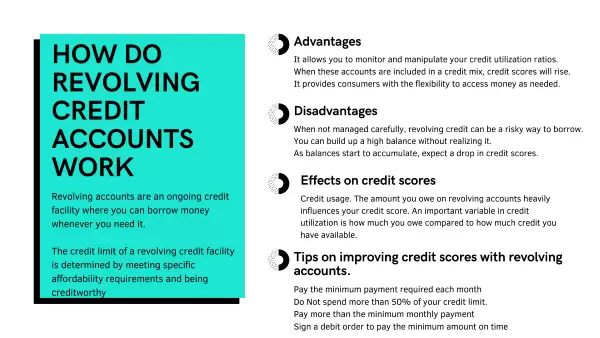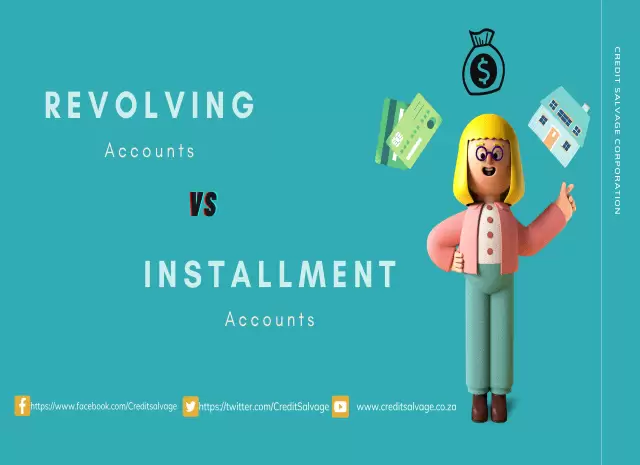Revolving credit versus instalment credit and Credit scores
Have you ever wondered what the difference is between revolving credit vs instalment credit? Your credit score depends on your historical and current payment history, default listings, and debt to income ratio. Did you know, though, that the type of debt you have matters? When bureaus calculate these scores, some debts are considered more important than others. This post focuses on two categories of accounts that have a significant impact on your scores with all the bureaus. These are revolving vs instalment facilities. Let's dive right in by starting with revolving credit.
Revolving credit.
Revolving credit is a credit facility with a pre-approved credit limit determined by your affordability and creditworthiness. A revolving account enables you to withdraw funds from it, and then when you repay some of the facility, you can access more funds from the facility in the future. Simply put, revolving accounts are an ongoing credit facility where you can borrow money whenever you need it.
The credit limit of a revolving credit facility is determined by meeting specific affordability requirements and being creditworthy. Credit cards and revolving loans are the two most common forms of revolving credit. You can decide how much of your credit limit you wish to use. Most revolving loans operate as lines of credit, where the borrower spends then repays the portion they used. You will be able to use the facility again in the future.
What effect do revolving accounts have on your credit scores?
A revolving credit account allows you to borrow as much as you like, up to the credit limit you qualify. Depending on how much you owe, the credit provider will inform you of the minimum instalment through a monthly statement.
Poor payments can severely damage a credit report score, so make sure to pay every month on any revolving account. Your different credit bureau scores will be negatively affected if you miss a payment.
Usage. The amount you owe on revolving accounts heavily influences your score. An important variable in credit utilization is how much you owe compared to how much credit you have available.
You will notice an increase in scores when you only use a small percentage of a revolving credit limit.
Revolving credit: its advantages and disadvantages
It is possible to damage your bureau score if you misuse cards or revolving facilities in any way. A revolving credit account, however, will boost your credit score if you manage it correctly. This type of account offers three benefits:
- Revolving accounts allow you to monitor and manipulate your credit utilization ratios as needed.
- By adding these accounts to your credit mix, you will increase your different bureau credit scores.
- Revolving credit provides consumers who qualify with the flexibility to access money as needed.
When not managed carefully, revolving credit can be a risky way to borrow. Your credit utilization ratio plays a huge part in determining your credit score. Due to the nature of revolving accounts, it is easy to abuse these accounts without ever noticing. The danger of revolving facilities is that you can build up a balance without realizing it. As soon as your outstanding balances start to accumulate, you can expect a drop in your credit score. A high utilization ratio will negatively affect all your bureau scores.
Check out these tips on improving your credit scores with revolving accounts.
- Pay the minimum payment required each month into your revolving account without fail.
- Make sure you spend no more than 50% of your credit limit. If you spend more than 50% of your limit, your utilization ratio may be affected.
- Consider paying more than the minimum monthly payment.
- Sign a debit order to pay the minimum amount on time. Sign a stop order at your bank to pay a predetermined amount extra if you wish to pay more than the minimum.
- Ensure this type of account never gets into arrears by checking your statement and credit report each month.
Using revolving credit wisely will increase your score as it is one of the best credit score boosting accounts in your credit mix.
Getting help
The Credit Salvage Bureau Clearance service is available to individuals who dedicate themselves to improving their creditworthiness.
In completing our ITC clearance process, we help to ensure that prospective lenders and credit providers know that you are a responsible consumer. Credit providers use bureau scores to assess every application and will only grant new facilities to low-risk applications.
In addition, these companies will evaluate and assess your ability to service your current debt. We will help you create a new profile by removing or updating old adverse items!
Should you struggle to improve your score by manipulating revolving accounts to your advantage, give us a call or click the picture link below. We will either advise you free of charge or inform you when we believe you need to enroll for our comprehensive ITC clearance process.
How to manage these types of accounts during a financial crisis.
You should act as soon as possible if you encounter a cash shortfall and can't manage payments on your revolving and instalment accounts. Managing unmanageable debts is possible with the help of debt counselling. You can use this service if you have revolving or instalment facilities such as credit cards, personal loans, payday loans, revolving loans, or any other type of debt.
Credit Salvage is here to help you if you want advice on handling your money and reducing or eliminating your outstanding revolving and instalment accounts. We are here to help you regardless of how much money you earn or how you are employed. You can count on us for confidentiality, and we will never pressure or judge you.
As long as you are committed to this process, you can be confident you will have the opportunity to enjoy a debt-free financial future. By providing you with financial solutions today, we strive to prevent debt troubles for you in the future.
With the debt review process, you will have no problem managing your money smartly and successfully. With debt review, you will be able to create a safety net that protects you against unforeseen difficulties and unpaid items on your credit report. We will be friends to you, encouraging, supporting, and providing the tools and information you need.

Installment credit
Instalment credit comes in the form of a loan that you pay back in steady payments every month. Loan amount determination occurs at the time of approval, and the amount you have borrowed does not change over time. Unlike revolving credit, you will not have access to this facility once you have repaid a part of it. A home loan and a vehicle finance account are two examples of instalment credit.
Instalment credit differs from revolving accounts and requires a fixed number of payments. As an example, this set monthly payment includes interest over 60 months. Revolving credit requires only a minimum repayment plus applicable fees and interest charges. Minimum payments depend on the balance at the time when your statement closes.
What is the impact of installment credit on your credit report?
Compared to revolving credit, instalment credit is a little more straightforward. Payment history contributes the most toward your credit score, like revolving accounts. You will be improving your Transunion, Experian and Compuscan scores if you keep paying all your instalment credit accounts on time. In the same manner, missed payments will adversely affect your credit history and credit scores. When you are paying on time monthly, your account balance will reduce. In this manner, you will be building a positive repayment history on your credit report.
Can installment Loans increase credit scores and credit histories?
Paying the instalment accounts on time is one of the best methods for building and improving credit histories and scores. The payment history of a consumer is the main factor that impacts their score. Payments made on time demonstrate to credit providers your responsibility in managing your debt.
Paying an instalment loan as agreed and in time will have favorable effects on bureau reports. If you settle an instalment account early, your score will not significantly increase as opposed to when you repay an instalment account on time.
In the case of an instalment loan with a zero balance, the account is then closed. Unless the account is closed on request, a revolving account will remain open even after full settlement. Your credit report will continue to show those closed accounts for five years. Your credit score will significantly benefit from this history if you paid your instalments on time.
What are the positive effects of installment accounts on your credit profile?
You may benefit from instalment accounts if:
- Your payments are always on time. When you pay your instalment accounts regularly and on time, and the credit providers report your credit activity accurately to the credit bureaus, installment accounts will increase your credit score. You will boost your credit score if you pay your instalment account on time, but if you skip a month, you will seriously damage it. An installment account payment history determines a credit score, just as it does with revolving loans.
- Repossession of a car and foreclosure of a home will have devastating adverse effects on credit scores.
- Credit Mixture. You can diversify your credit types by adding an instalment account if you primarily use revolving credit like credit cards and clothing accounts. Having a different variety of credit elevates credit scores.
Conclusion - Revolving credit versus installment credit
Your credit report will play a significant part in your financial life. A good bureau report is essential for several reasons, including qualifying for a credit card or instalment accounts like a car or a house. However, having a good bureau report also plays a crucial role in more mundane things such as renting a home, apartment; being approved for a cell phone contract, and even getting a job.
We have talked about how a revolving account is different from an instalment account but does one impact your score more than the other? Our previous discussion also covered the importance of having a mix of different credit accounts in a credit portfolio. If you ask if one is better than the other, in most cases, the answer that you are looking for will depend solely on your credit portfolio.
Credit scores consider both these types of accounts to be vital factors in a credit mix of a consumer. From a credit perspective, these accounts serve different purposes. A home loan or vehicle finance instalment would be more likely to help you achieve your financial goals. Revolving accounts help you manage your finances by allowing for simpler payments and offering better flexibility whenever you need to purchase small-ticket items.
With careful management of a revolving account, you will be able to improve your credit report and credit scores. Revolving accounts are good tools for building credit reports and credit scores. A good credit report with good scores will open doors for home and vehicle finance.
Revolving and instalment accounts are quite diverse types of accounts, but both will affect credit scores. Managing both types of accounts well will ensure a steady increase in scores.
Sources - Other good reads
- How to dispute incorrect information Credit report
- New debt relief bill. Here's what it means for you
- Fighting financial depression with Debt Counselling
- Debt Counselling Calculator - Credit Salvage
- Acquiring a loan, home loan or vehicle finance
- New debt relief law will make it hard to get credit
- Debt Management company - Can they really help you get out of debt



